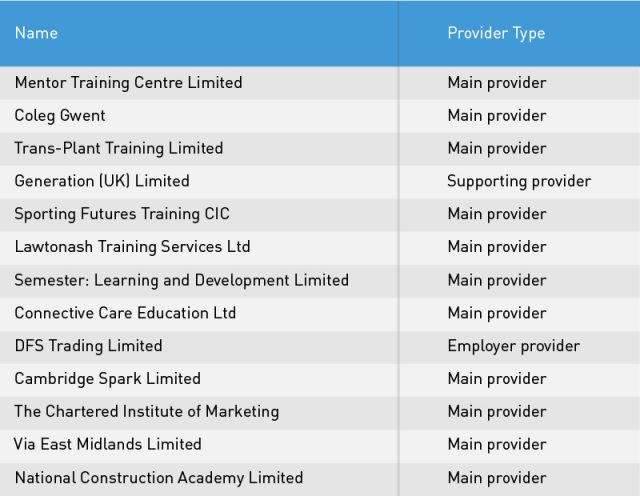National Apprenticeship Week has proved to be a time of contrasting grades for this type of provision – with one college receiving the highest possible rating, and two providers receiving the lowest.
Calderdale College was rated ‘outstanding’ for apprenticeships, but held onto its grade two overall, in a report published March 9 and based on an inspection in late January.
Managers were found to “relentlessly pursue excellence” in the college’s apprenticeship provision, with the result that “current apprentices are making substantial and sustained progress from their starting points”.
Governors and senior leaders were praised for creating a “culture of high expectations” and for having a “good understanding of the strengths and weaknesses of the college”.
A “high” proportion of learners on 16 to 19 study programmes were now completing their courses – although “too few” learners in this group were gaining high grades in GCSE maths, the report said.
Meanwhile, independent learning provider MI ComputSolutions Incorporated and Barnfield College could lose their right to deliver apprenticeships, after their provision was rated ‘inadequate’ this week – in reports that graded both ‘requires improvement’ overall.
The grades mean both should be taken off the government’s register of apprenticeship training providers, according to recently-clarified rules from the Education and Skills Funding Agency. Barnfield confirmed today that it has suspended its recruitment of new apprentices.
Leader and managers at MIComputSolutions were criticised for failing to take “sufficient action to remedy the weaknesses in apprenticeship provision identified at previous inspections”, in a report published March 9 and based on an inspection in late January.
In addition to its ‘inadequate’ apprenticeship grade, the London-based provider received a grade three overall and in two headline fields but was rated ‘good’ in a further three areas.
“The quality of teaching on adult programmes, which make up the large majority of courses, is good,” the report noted – while adult learners were “highly motivated and grow in confidence and self-esteem”.
As previously reported by FE Week, Barnfield College was given the lowest possible rating for its apprenticeship provision but grade three overall, in a report published March 7 and based on an inspection from mid-January.
“The provision for apprenticeships is ‘inadequate’ and has declined in quality for the last three years,” the report said.
Elsewhere, it was good news for Heart of Worcestershire College, St Francis Xavier Sixth Form College and adult and community learning provider CXK Limited who all boosted their ratings from three to two.
Senior leaders and governors at Heart of Worcestershire College were found to have “successfully tackled the most significant areas for improvement”, in a report published March 7 and based on an inspection in late January.
The proportion of learners achieving their qualifications “has improved”, and the “majority” of apprentices now completed their courses on time, the report said.
The “vast majority” of teachers at St Francis Xavier Sixth Form College “teach lively and challenging lessons”, according to a report published March 6 and based on an inspection in late January.
“Teachers give students very clear and detailed feedback on their work to enable them to understand what they need to do to improve,” the report said.
But it also noted that “too few” students achieved their expected grades “given their prior attainment”.
Learners at adult and community learning provider CXK Limited “gain enthusiasm for learning” despite many of them having had “negative previous experiences of education”, according to a report published March 9 and based on an inspection in early February.
“Staff support learners well to improve their confidence and motivation”, with the result that most achieve their qualifications.
Bracknell and Wokingham College held onto its grade two overall rating in a report published March 5 and based on an inspection in late January.
“Leaders and managers have created a secure and welcoming learning environment in which students and apprentices feel safe and enjoy their learning,” the report said.
The proportion of apprentices achieving their qualifications had “increased”, inspectors noted.
But they also warned that the “college’s financial position is weak”.
Employer provider The Headmasters Partnership Limited dropped from ‘good’ to ‘requires improvement’, in a report published March 7 and based on an inspection in late January.
The proportion of hairdressing apprentices achieving their qualifications on time “dropped in 2016/17 and is too low”, the report said.
And apprentices’ “attendance and punctuality” was deemed “not good enough” and not reflective of the “behaviours expected for employment”.
As previously reported by FE Week, Sheffield College held onto its ‘requires improvement’ rating this week, in a reported published March 7 and based on a late-January inspection.
Five providers kept their grade two ratings this week following short inspections – Sparsholt College, independent learning providers GB Training (UK) Ltd and Remit Group Limited, adult and community learning provider Leicestershire County Council, and Loughborough University’s School of Arts, English and Drama.
| GFE Colleges | Inspected | Published | Grade | Previous grade |
| Calderdale College | 30/01/2018 | 09/03/2018 | 2 | 2 |
| Heart of Worcestershire College | 30/01/2018 | 07/03/2018 | 2 | 3 |
| Sheffield College | 22/01/2018 | 07/03/2018 | 3 | 3 |
| Barnfield College | 16/01/2018 | 07/03/2018 | 3 | 3 |
| Bracknell and Wokingham College | 23/01/2018 | 05/03/2018 | 2 | 2 |
| Sixth Form Colleges (inc 16-19 academies) | Inspected | Published | Grade | Previous grade |
| St Francis Xavier Sixth Form College | 23/01/2018 | 06/03/2018 | 2 | 3 |
| Independent Learning Providers | Inspected | Published | Grade | Previous grade |
| MI ComputSolutions Incorporated | 30/01/2018 | 09/03/2018 | 3 | 2 |
| Adult and Community Learning | Inspected | Published | Grade | Previous grade |
| CXK Limited | 06/02/2018 | 09/03/2018 | 2 | 3 |
| Employer providers | Inspected | Published | Grade | Previous grade |
| The Headmasters Partnership Limited | 23/01/2018 | 07/03/2018 | 3 | 2 |
| Short inspections (remains grade 2) | Inspected | Published |
| Sparsholt College | 01/02/2018 | 07/03/2018 |
| G B Training (UK) Ltd | 14/02/2018 | 06/03/2018 |
| Remit Group Limited | 29/01/2018 | 05/03/2018 |
| Leicestershire County Council | 05/02/2018 | 09/03/2018 |
| Loughborough University | 06/02/2018 | 09/03/2018 |




